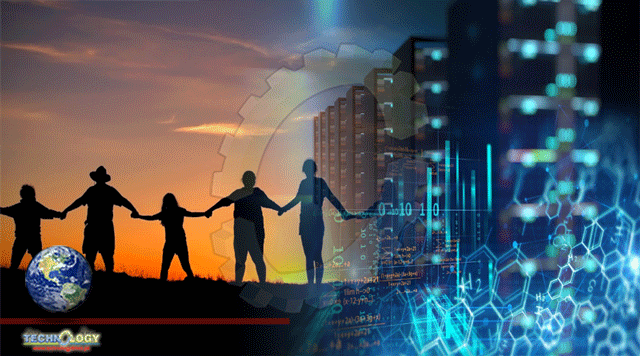How do we future-proof the values and knowledge of people in a world defined by technology? The questions posed by the exponential rise in frontier technologies are many, and they leave civilisation sitting at a point that is more spaghetti junction than crossroads.

Navigate them, though, and the road ahead looks bright. But we can’t just pop desirable future into the SatNav for this journey to work out. People will need to work together, reconnect with nature, and make a commitment to harness technology ethically – and in a way that benefits everyone: there are no simple shortcuts to success here.
Technology is amazing, used in the right way it can bring a better future into sight for all, but that future will quickly disappear into the rear view mirror of millions if it is not used ethically. The will exists to get it right and the instruction manual for pointing the way can learn a lot from indigenous practices.
Technology and nature
The modern era did not give birth to the concept of technology, it has been at the heart of accelerating progress for millennia. Indigenous peoples have always shared technological knowledge with each other and between communities. It only becomes something other when it is seen as being separate from humanity. The corrosiveness of this type of relationship is being felt now, with the disastrous breakdown in what should be a symbiotic oneness between nature and people. The world is waking up to the need to fix that problem, and there is a lot more work now going on to fix the relationship between technology and people.
Examining where things stand on these issues, and looking at what should happen next, the G-STIC Dubai conference is all about charting the roads ahead, those which show the most promise in delivering the UN Sustainable Development Goals and moving the world beyond the spaghetti junction.
The democratisation of tech
Making sense of it all is no easy task, and will require all of humanity’s natural algorithms to be laser focused on finding the best solutions.
One series at G-STIC, which will examine aspects linked to the democratisation of technology, will explore indigenous values and the future of digitalisation, as well as the role younger people should play in ensuring that in a generation – roughly 25 years – the future they and their families inherit is a desirable one.
The sessions on these critical topics have been convened by Dr Sandra Piesik of 3 ideas B.V., in collaboration with the Resilience Frontiers Initiative, and Dr Youssef Nassef, Director, Adaptation, UNFCCC, Zayed University, and Dr Dietrich Van der Weken of G-STIC, VITO. The first in the series, titled: the democratisation of technology (dtech): indigenous values and the future of digitalisation, kicks off on 24 October; with a workshop, dtech: paving the way towards a desirable 2050 future by understanding our younger generation’s aspirations, following two days later. Learning from these sessions will then feed into January’s dtech event: living the change in a post-pandemic world.
“In partnership with the Resilience Frontiers Initiative, Zayed University, G-STIC, VITO and 3 ideas B.V., this workshop on 26 October will use methodology developed by the Resilience Frontiers Initiative together with foresight provided by 4CF to frame a regional case study around date palm oasis ecosystems,” the organisers said. “A group of students from Zayed University will be engaged to shed light on their social aspirations for the future in the context of natural resources, human settlements, circular economy, new materials, and frontier technologies.
“The students, in collaboration with a multidisciplinary team of experts, will be also asked to apply the values, principles and a worldview associated with indigenous networks and their information management systems to the assimilation of frontier technologies, including blockchain.
Originally published by Innovatos